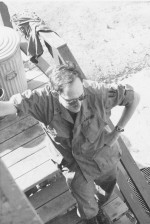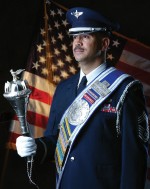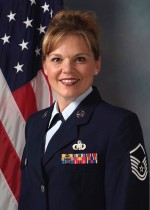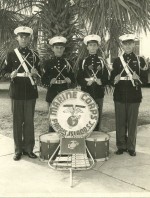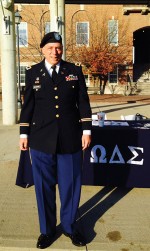Column Name
Title
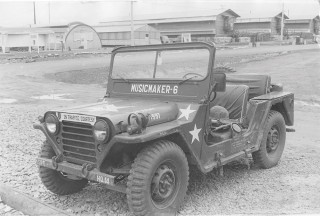
Alum Ken Laufer was stationed near a darkroom in Vietnam.
(Photo by Ken Laufer)This article is part of a special section on Juilliard's military ties.
Christopher Venditti (right) was one of three West Point Band Hellcats who played at a New York Giants game in September. “The stadium went berserk at the ‘land of the free and home of the brave.’”
Wallace Deyerle (Diploma '57, percussion), pictured at left, served in a Marine Corps band during the Korean War.
Adam Driver (Group 38) was a Marine before entering Juilliard. While he was here, he and his future wife, Joanne Tucker (Group 38), started what would become Arts in the Armed Forces, in which he’s still very active in between juggling his career as a leading man.
Jonathan Newmark (Pre-College ’69, piano) is a neurologist who joined the Army Reserve midcareer and recently retired in 2013 as a full colonel in the Medical Corps, where he was one of the country’s leading authorities on the medical response to chemical and biological warfare. He's still consulting as well as performing (mostly viola and harpsichord), and he's also working on a master's degree in composition.
(Photo by Gail Stocker)Body
More than a year ago, we put out a call for stories of community members with military ties. The response was fabulous. We learned about alums who’d seen active duty from World War II (some of them were profiled in the May issue) to the present. But the vast majority are or have been, not terribly surprisingly, affiliated with military music groups, ranging from former faculty member Samuel Adler’s postwar Seventh Army Symphony to the present day. A few of their stories appear in this issue. Some more will be online, as will be the beginning of a list of all the current Juilliard community members in service bands. Please let us know if you have any comments about the list or the article at journal@juilliard.edu or (212) 799-5000, ext. 340. In the meantime, happy Veterans Day.
"While stationed outside of Washington, D.C., in 1968 in an Army band, I entered the International Bach Piano Competition. The day before the preliminary rounds, I was informed of my next location: Vietnam. So I not only had the usual nerves before such a musical ordeal, plus a terrible uncertainty about what would happen to me in Southeast Asia, but also the task of telling my parents the news when they came down to D.C. from New York to see me—their only child—play.
"On my first night in Vietnam, while worrying about which of the local Army bands I’d end up getting assigned to—most were in unsafe locations—we were attacked by incoming rounds. The next day I was very fortunate that a French horn player who knew me from Juilliard got me into the headquarters band on Long Binh (the largest U.S. base and fairly safe). The band certainly didn’t really need a piano player, but I played bass drum and glockenspiel with them.
“During my year in Vietnam, I played a few piano recitals (the “Goldberg” Variations, Pictures at an Exhibition, etc.) around the country. At other times, we filled sandbags and guarded what was possibly the number-one target in Vietnam: where all the helicopters were stored. They would have sent these musicians on this last task without flak jackets, if I hadn’t complained! The band also played at official functions along with a few band concerts and openings for U.S.O. shows. Like many people at the time, we were very critical and sarcastic about the U.S. military being in Vietnam. Real protest seemed pointless, but we did sneak embellishments like trills and triplets into the national anthem, right in front of the generals. Through the years since then I have become ever more knowledgeable about and opposed to the insanity and criminality of violence and warfare. I compose a lot of antiwar choral music that I try to make very melodic so audiences will remember them. To my several Dona Nobis Pacems, I add a few discrete sentences like ‘There’s always an excuse for another war.’ None have been performed yet.”
—Kenneth Laufer (MS ’66, piano)
The Air Force bands were created on September 24, 1941, and currently employ 605 musicians all over the country in 15 Air Force and Air National Guard bands, among them the Singing Sergeants, the U.S.A.F. Band of the West, and the Academy bands. They hire about 45 musicians and one or two conductors annually.
After graduating from Juilliard, Edward Teleky (BM ’85, MM ’87, percussion) was freelancing in Broadway pit bands, but when an Air Force Band recruiter came to Juilliard, he realized that the idea of having a steady income and being able to “play in a world-class musical environment” appealed. Last month, 28 years later, he retired from the Air Force Band, immediately moving into a civilian role as the director of operations. He oversees band, honor guard, and chaplaincy for nearly 500 people handling 4,000 missions a year. The bulk are funerals, although recently they played for the arrivals in Washington, D.C., of the pope and the premiere of China.
One of the hardest things to adjust to in being in the Air Force band, Sarah Stewart (MM ’90, bassoon) says, was the programming diversity. “I was used to sitting down and just playing Brahms for an hour and a half,” she said, as opposed to a concert that switched back and forth among jazz, pop, patriotic, and classical. “It was a lot to take in as a young airman, but that’s what our audiences love—there’s really something for everyone.” Though Stewart had been on what she called “the orchestra train” at Juilliard and in a subsequent N.E.A. Chamber Music Rural Residency, a chance sighting of an ad for an Air Force Band audition ended up changing her career. “It’s not for everyone, but it really works for some musicians,” she says nearly 20 years after signing up. She’s still playing bassoon and sax in the U.S.A.F. Academy Concert Band, Marching Band, and Rampart Winds; she’s the director of productions (lots of logistics); and she does a ton of outreach work. “One of my favorite parts about it is the people we play for and how they react to us. After a concert, there’s always someone who wants to tell you their story and that’s what it’s all about. There’s nothing more rewarding.”
The West Point Band, formed in 1817, is the oldest continuously active army band. It has four divisions that perform more than 6,000 times a year and 78 members, among them four Juilliard alums including Christopher Venditti (BM ’08, MM ’09, trumpet), who joined in 2011. Bruce McLellan (BM ’68, French horn) is one of many alums who have been in it over the years. There are currently 33 Army bands, a number that will drop to 26 in 2017 due to budget cuts. But it’s still the largest single employer of musicians in the country.
”Since joining the Army, I’ve played taps a few hundred times. Earlier this year I arrived at a cemetery and found out that there was no next of kin for the deceased veteran that we were honoring. The cemetery workers gathered around the grave, the honor guard came to attention and saluted, and I performed taps. It was so special to be able to fulfill that one last promise to that soldier even though there was no one there to hear it. It was one of those moments that I will remember for my whole career.
“I’m a bugler for the Hellcats, a subgroup of the West Point Band that has about 14 musicians. Every morning at 6:30, a cannon goes off, the flag goes up, and one of us plays reveille. Throughout the day we play field music for the West Point cadets as they do formations and march into meals. At 5pm the flag is lowered and we play retreat. The rest of the time, we play at ceremonies, changes of commands, funerals, parades, special occasions—all sorts of things.
“In an orchestra when they hire you, they put you to work. In the Army, they send you to basic training. The physical side is very hard, but the mental side is harder. Once those 10 weeks were over, we still had to stay in shape and pass physicals every six months: being fit and looking good in uniform is part of what’s expected of you in the Army band. One of the plus sides of the experience, I can say now, is that I’ve turned myself into a runner. There’s a contingent of us in the band who run long distances— in two weeks, I’m going to do my third marathon.
“The best part of doing this work—other than the steady job and benefits—is the camaraderie. It’s not unlike musician world, where you’ve got a very tightknit group with a lot of common bonds. Sometimes we know far in advance what we’re going to be doing and sometimes we have very short notice, but that’s part of the Juilliard training—excellence in all things you do at all times. Juilliard is very good preparation for this work—at school you might have had three rehearsals and then have to play at Carnegie Hall. Excellence is demanded.”—Christopher Venditti (BM ’08, MM ’09, trumpet)
”Automatic draft deferments for graduate school were going to be stopped the year I got my bachelor’s from Juilliard, and the draft board in my hometown had told me I could expect to be drafted upon graduation. To avoid that, I auditioned for the West Point Band in the fall of 1968 and was accepted for an opening in 1969. One positive effect of this was that I played in the Aspen Chamber Symphony in the summer of 1968 and did the Montovani [a 1950s and ’60s conductor, arranger, and mood-music sensation] tour that fall.
“My most positive memories of my time in the West Point Band are getting to work with some terrific players—many of my colleagues went on to the Met, L.A. Philharmonic, Cleveland Orchestra, New York Philharmonic, Dallas Symphony, careers in Europe, and the list goes on. My least favorite memory? Basic training at Fort Jackson, S.C.”—Bruce McLellan (BM ’68, French horn)
"In 1951, I was taking private lessons from Juilliard percussion teacher Morris Goldenberg (Diploma ’32, percussion; faculty 1942-69) when I was called up by the military draft for the Korean War. I reported for induction in September 1951, and much to my surprise instead of the Army, I was sent to the Marine Corps Recruit Depot at Parris Island. I didn’t know until after boot camp that I would be joining the post band. We played for parades and special events, and also had a dance band within the main band. For two years the band went to Miami and played at the annual Orange Bowl football game on New Year’s Day. We also played for the occasional funeral for a fallen Marine.
“After the draftees’ two-year term of service, I returned to New York and enrolled as a full-time student at Juilliard, thanks to the G.I. Bill. I resumed my percussion studies with Mr. Goldenberg and played in the orchestra under Jean Morel (faculty 1948-71). My L&M teacher was Richard Franko Goldman (faculty 1947-60), who, after I’d graduated and worked as a freelance percussionist, invited me to join the Goldman Band—a summertime tradition for many years in New York parks—as timpanist.”—Wallace Deyerle (Diploma ’57, percussion)
In part inspired by being at Juilliard when the September 11 attacks happened, Julianne Marie Henderson (BM ’05, MM ’06, viola) became a physician and serves in the Army in Canada.
Benjamin Wodjiak (’04, dance) joined the Army after leaving Juilliard and served in Afghanistan.
"I took the Air Force band audition on a whim, and while I hadn’t ever really planned on joining the military I do feel lucky to be playing my instrument full time and getting paid for it! I also do quite a bit of freelancing in the area with various orchestras, and Juilliard helped me be prepared for that, but there are many days [in the Air Force Band] where we joke, “I didn’t prepare for this at Juilliard!” But I do have to use skills like sight reading and adjusting quickly to different styles of music, and while we certainly didn’t play a lot of pop or jazz, etc., at Juilliard, I think I learned the skills to adapt. And I especially love the outreach part of the job. It’s fun to inspire young minds and see them excited about music."—Sandra Johnson-Sisk (BM ’02, bassoon)
"After Juilliard, I had some student loan debt, and the Army had a really amazing loan repayment incentive. I enlisted, and the Army paid off my debt in three years, and I got to make a decent living playing my instrument. I decided to go back in to the military when I was nearing the completion of my seminary studies. I’m not a typical army chaplain—I’m a reservist, so I’m only in uniform about one weekend per month, and I serve overseas, where my normal weekends usually include a blend of military training, staff work, and ministry activities. I enjoy it, for the most part. From some people, I get a great deal of appreciation and respect; from others, I get the cold shoulder and sometimes even some animosity. For most people, I’m just another part of the team, and we all work to get the mission accomplished."—Steve Walton (MM ’92, tuba)
"I joined the Air Force at age 33 after freelancing and having small and then larger principal jobs—the job kept showing up in the union paper and it had better pay and benefits than I did. It’s a very unique job. You can be playing for the Secretary of State one night, the Vice President the next, and then schoolchildren after that. On occasion we have to play outdoors in some pretty rough weather, and we’ve also had a couple string members deploy to the Middle East. After a couple years, you’re expected to perform nonmusical duties—the entire band is operated by the musicians. Juilliard and the military are alike in terms of self-discipline; you have to be self-motivated to maintain a high musical standard for your personal musical growth. It’s easy for that growth to get lost in the day to day life of being in the military."—Wayne Graham (MM ’93, viola), T Sargeant, NCOIC, Air Force Strings Operations

